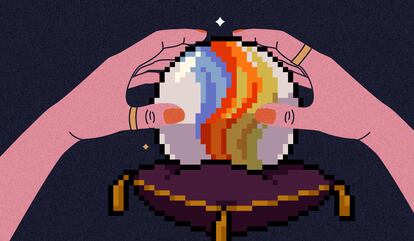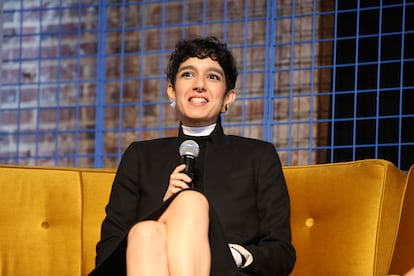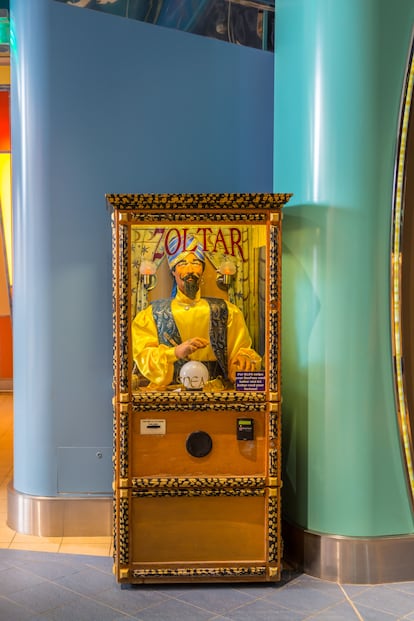‘Quit seeing your therapist’: the dangerous astrological advice created by artificial intelligence
New companies, especially Co-Star, that opt for technology over astrologists to read believers’ futures, are putting their users in a pickle: it’s not credible if AI says it, but is it any better coming from a real person?

Artificial intelligence, according to numbers from Goldman Sachs, is going to destroy around 300 million jobs around the world in the next 10 years. The U.S. financial firm predicts that it will eventually create other kinds of employment, but that in any case, more than half of the current workforce will have to acquire new professional skills in order to adapt to this technological tsunami.
Among those who will need to change career tracks in the very short term, replaced by machines that can perform their jobs, if not better than them, but at a much lower cost, are astrologers. Susan Miller, a New Yorker who has been writing horoscopes for all kinds of media for decades, accepts this fact with a certain resigned elegance. The forecasts and astrological charts of the future will be produced by generative intelligence programs, such as the ubiquitous ChatGPT. It’s already happening, and the shift has not always been obvious. At some supposedly analogue media companies, astrological duties once delegated to interns in the absence of staff astrologers have been handed over to the machines.
Miller considers it “unfair” that AI is now being used to put professionals with “specific training” out of work, particularly those whose jobs involve dealing with “human emotions”. In her opinion, machines should be relegated to “splitting atoms”, not to observing the stars to “try to recognize signs that may be useful in guiding human behavior”. If they are tasked with the latter, according to Miller, “they will make mistakes”. And those wrong answers “will stay with the people who consult them wherever they go.”
Celestial machinery
Nonetheless, as worthy as the position of the beleaguered Ms. Miller may seem, it must be remembered that this “specific training” she claims to have is of no real value. Astrology has no scientific basis. It is, however, part of a tradition that goes back at least to Mesopotamia in the second millennium B.C.E., where something similar to modern horoscopes and astrological charts was already taking shape. Such Chaldean “wisdom” has been replicated by cultures such as that of the Mayans, Chinese, Hindu and Greek (itself derived from Mesopotamia), and it has never ceased to be one of the many branches of this buoyant multinational project that is magical thinking.

Limited to the company of esoteric circles since the rationalist approach made its way across the Western world, astrology was reborn in the mid-20th century in a version apt for domestic consumption and associated with New Age spiritualities, which even its staunch followers did not always take seriously. Seen in that light, it’s surprising that it has survived well into the 21st century. And, that nowadays, artificial technology is giving it a new viability that no one predicted.
Last summer saw the birth of one of the most colorful and efficient marketing campaigns to link with astrology in the last half-century. It was spearheaded by Banu Guler, a 35-year-old new-school technology guru, founder and CEO of an “intelligent” horoscope company called Co-Star.
In July, Guler and her team created an odd contraption that was a cross between an industrial centrifuge, Soviet computer and Doctor Who telephone booth, at the main entrance of Iconic Magazines, one of the most popular bookstores in New York’s NoLita neighborhood. The object answered “astral queries” instantly. Any passerby could approach its viewfinder to have his or her photo taken, and then type in a question, along with the exact time, date and place of their birth.
The New York Times columnist Saam Niami, whose zodiac sign is Taurus, was there, and interviewed some 20 users of the curious service, certifying that the majority of them seems satisfied with their experience. To questions like “What are my red flags?” the machine gave responses that would not be out of place in any IRL astrological consultation: “Your red flags include a tendency to set high expectations and a fear of conflict. Your Jupiter and Saturn placement suggests a need for perfectionism and a fear of rejection. By avoiding conflict, you may limit your potential for growth and meaningful connections.” Did it ring true? In the opinion of the 19-year-old student who placed the query, it certainly did. She found it as convincing as any other astrology-based, express dissection of her personality.
Do androids dream of electric psychics?
After its New York moment, the machine embarked on a tour through the United States whose next stop, Guler said, was inspired by an arcade attraction that was all the rage at the beginning of the 20th century, the mechanical fortune-teller Zoltar, which dealt you cards at a price of a couple cents. A more sophisticated variation, the Verbal Fortune Teller, included visual effects and voice recordings. The illusionist David Copperfield offered millions of dollars for the last remaining machine of its kind, which is owned by a museum in Virginia City, in Montana. For Guler, what the machines of the past and the one designed by her company have in common is that “they provide a personalized response to your questions, you take it home and, although you may not assign it the least bit of importance in the moment, it’s possible that you’ll come across it by chance later on, and it may make you reflect.”

Beyond the showy sleight-of-hand tricks with which Co-Star is popularizing its brand, the company has demonstrated its viability through a product, an app called The Void, which gives “highly personalized” responses to all kinds of astral consultations for a service charge that starts at a dollar. With versions for IOS and Android, the app guarantees access to a database of astrological observations so vast that, in practice, according to Co-Star’s website, “it’s equivalent to having a personal astrologist, a privilege reserved until very recently for aristocrats and royalty.”
The site also boasts a “powerful” natural language motor that draws on “data supplied by NASA”, to which it applies “professional astrology” screening methods, and algorithmically generates unique and singular answers tailored to the astral characteristics of each individual user. Guler and her team say, with messianic ardor, that the function of astrology is “to put our temporal bodies in tune with the vastness of the universe, allowing a dose of irrationality to penetrate the techno-rationality of the way we live.”
Last December, The Atlantic writer Katherine Hu wrote a profile of Co-Star. In it, she asks whether astrology based on artificial intelligence isn’t going “too far”, given that one of the pieces of advice that The Void offered her was to ditch her therapist as soon as possible. Hu interviews Guler and takes a look at her arguments with understandable skepticism. From the get-go, she does not seem to give too much credence to claims such as the one that says the app has “30 million registered accounts”. A data.ai analysis finds that The Void has registered monthly peaks of up to 800,000 users, a respectable number, enough for Hu to accept that, since its creation in 2017, “Since its launch in 2017, Co–Star has contributed to a resurgence of Western astrology,” a phenomenon that has already been heralded, also in The Atlantic, by writer Julie Beck.
The era of digital spirituality
Another symptom of this concept could be the popularity of AI Astrologer, a daily horoscope generator available through Apple that may not be more than rudimentary, but which demonstrates how easy it is for anyone to make “the dive”, as its founders propose, “into the enchanting world of your zodiac signs,” reinforced by artificial intelligence. Services such as OnmiMind and Vedic AstroGPT also prove that, when it comes to developing new kinds of business technology and arcane mysticism (that is, the coupling of the enterprising son of science and one of his mother’s fiercest rivals) compliment each other wonderfully.
Nika Simovich Fisher writes in a Wired article that AI has brought us face to face with “the new phase of digital spirituality”. Fisher recalls that the first horoscope-generating software goes back to the end of the 1970s and that digital astrological services like those of Astrodienst have been around for at least 20 years.
The only novel ingredient in this concoction of vanguard and mysticism is the consolidation of an “ecosystem of astrological startups” which, led by the popularity of the “Chaldean science” on networks like Instagram and Tumblr, have dedicated themselves to exploiting the possibilities offered by natural language generation models. After all, if interactive pages like BibleGPT respond to any practical, spiritual or existential consultation with a verse from the Bible to return balance to your life, why wouldn’t the signs of the zodiac offer you, for a small free, their own automated answers?
Sign up for our weekly newsletter to get more English-language news coverage from EL PAÍS USA Edition
Tu suscripción se está usando en otro dispositivo
¿Quieres añadir otro usuario a tu suscripción?
Si continúas leyendo en este dispositivo, no se podrá leer en el otro.
FlechaTu suscripción se está usando en otro dispositivo y solo puedes acceder a EL PAÍS desde un dispositivo a la vez.
Si quieres compartir tu cuenta, cambia tu suscripción a la modalidad Premium, así podrás añadir otro usuario. Cada uno accederá con su propia cuenta de email, lo que os permitirá personalizar vuestra experiencia en EL PAÍS.
¿Tienes una suscripción de empresa? Accede aquí para contratar más cuentas.
En el caso de no saber quién está usando tu cuenta, te recomendamos cambiar tu contraseña aquí.
Si decides continuar compartiendo tu cuenta, este mensaje se mostrará en tu dispositivo y en el de la otra persona que está usando tu cuenta de forma indefinida, afectando a tu experiencia de lectura. Puedes consultar aquí los términos y condiciones de la suscripción digital.









































